new posts in all blogs
Viewing: Blog Posts Tagged with: UNHCR, Most Recent at Top [Help]
Results 1 - 9 of 9
How to use this Page
You are viewing the most recent posts tagged with the words: UNHCR in the JacketFlap blog reader. What is a tag? Think of a tag as a keyword or category label. Tags can both help you find posts on JacketFlap.com as well as provide an easy way for you to "remember" and classify posts for later recall. Try adding a tag yourself by clicking "Add a tag" below a post's header. Scroll down through the list of Recent Posts in the left column and click on a post title that sounds interesting. You can view all posts from a specific blog by clicking the Blog name in the right column, or you can click a 'More Posts from this Blog' link in any individual post.
posted by Neil Gaiman
It's very safe here: we're in Tennessee, in a perfect little house we are borrowing from a midwife who has gone out west to her son's wedding. We are cooking, eating, catching up on our sleep. Amanda's due in a week and her Nesting Instinct seems to be manifesting chiefly in trying to clean out her email inbox. She's also cleaning, washing and folding baby clothes and clean towels. I'm writing a lot, enjoying the lack of cell-phone connection, and the lack of internet connection, and getting things written without distraction. (I wrapped the first draft of a script on Thursday, wrote a preface to SANDMAN:OVERTURE on Friday.) We've felt like a couple for a long time. We're starting to feel like a family.
And the safety feels very fragile, and like something to be treasured.
There's a photo I'm not going to post. You've probably seen it already: it shows Aylan Kurdi, a three year old Syrian refugee, dead on a beach in Greece. It made me cry, but I know I'm overly sensitive to bad things happening to small children right now. I'm reacting as if he's family.
In May of last year I was in a refugee camp in Jordan. I was talking to a 26 year old woman who had miscarried her babies in Syria when the bombs started falling. She had made it out of Syria, but her husband had left her for another woman he hoped would give him babies. We spoke to women eight months' pregnant who had just walked through the desert for days, past the dead and dismembered bodies of people fleeing the war, like themselves, who had been betrayed by the smugglers who had promised them a way to freedom.
I gained a new appreciation for the civilisation I usually take for granted. The idea that you could wake in the morning to a world in which nobody was trying to hurt you or kill you, in which there would be food for your children and a safe place for your baby to be born became something unusual.
I wrote about my time in the Syrian refugee camps here, in the Guardian. (You can read it here:
http://www.theguardian.com/world/2014/may/21/many-ways-die-syria-neil-gaiman-refugee-camp-syria and you should, if you have time. I'll be here when you get back. And here are some photos from my time there:
http://www.theguardian.com/world/gallery/2014/may/21/neil-gaiman-syria-refugees-jordan-in-pictures)
Jordan, Turkey, Lebanon have, between them, taken in millions of Syrian refugees. People who fled, as you or I would flee, when remaining in the places they loved was no longer possible or safe.
The UN High Commissioner for Refugees has made a plea to Europe that you should read (and insist that whoever represents you also read) at
http://www.unhcr.org/55e9459f6.htmlThe only ones who benefit from the lack of a common European response are the smugglers and traffickers who are making profit from people's desperation to reach safety. More effective international cooperation is required to crack down on smugglers, including those operating inside the EU, but in ways that allow for the victims to be protected. But none of these efforts will be effective without opening up more opportunities for people to come legally to Europe and find safety upon arrival. Thousands of refugee parents are risking the lives of their children on unsafe smuggling boats primarily because they have no other choice.
The UN Refugees Agency wrote about words, and how they matter. In this case, the word
migrants and
refugees: they don't mean the same thing, and have very different meanings in terms of what a government's obligations are to them.
http://www.unhcr.org/55df0e556.html One of the most fundamental principles laid down in international law is that refugees should not be expelled or returned to situations where their life and freedom would be under threat...
Politics has a way of intervening in such debates. Conflating refugees and migrants can have serious consequences for the lives and safety of refugees. Blurring the two terms takes attention away from the specific legal protections refugees require. It can undermine public support for refugees and the institution of asylum at a time when more refugees need such protection than ever before. We need to treat all human beings with respect and dignity. We need to ensure that the human rights of migrants are respected. At the same time, we also need to provide an appropriate legal response for refugees, because of their particular predicament.
It's worth making sure that people are using the right words. A lot of the time they don't realise there's a difference between the two things, or that refugees have real rights -- the rights you would want, if you were forced to leave home.
A lot of people have been asking me about ways that we as individuals can change things for the better for refugees: there's an excellent article in the
Independent about practical things you can do to help or make a difference.
http://www.independent.co.uk/news/world/europe/5-practical-ways-you-can-help-refugees-trying-to-find-safety-in-europe-10482902.htmlUNHCR, the UN Refugee Agency, is feeding and housing and housing and helping literally millions of refugees around the world, always with the eventual goal of getting them safely home one day. Their funding comes from governments and private individuals all over the world. But this crisis has stretched them thin. You can help.
Donate to them at
http://rfg.ee/RN3uy -- and please, share the donation link: With your support, UNHCR will provide assistance such as:
- Deliver rescue kits containing a thermal blanket, towel, water, high nutrient energy bar, dry clothes and shoes, to every survivor;
- Set up reception centres where refugees can be registered and receive vital medical care;
- Provide temporary emergency shelter to especially vulnerable refugees;
- Help children travelling alone by providing specialist support and care.
As I said on this blog when I came back from visiting the camps:
I came away from Jordan ashamed to be part of a race that treats its members so very badly, and simultaneously proud to be part of the same human race as it does its best to help the people who are hurt, who need refuge, safety and dignity. We are all part of a huge family, the family of humanity, and we look after our family.
(I'd love it you would spread this post around, and spread the links inside it. People who know that I'm involved in Refugee issues have been asking me about places to donate and what to do and what to read, so I put this together for them, and now, for you.
http://rfg.ee/RN3uy was the donation link.)






By: ChloeF,
on 10/24/2014
Blog:
OUPblog
(
Login to Add to MyJacketFlap)
JacketFlap tags:
Henry Cabot Lodge,
Miguel Albornoz,
The United Nations,
UNDP,
Books,
Politics,
Geography,
World,
VSI,
unesco,
Very Short Introductions,
UNEP,
development,
UN,
UNHCR,
A Very Short Introduction,
*Featured,
IAEA,
Ebola,
Add a tag
In 1958, Henry Cabot Lodge Jr., the US ambassador to the United Nations, summarized the role of the world organization: “The primary, the fundamental, the essential purpose of the United Nations is to keep peace. Everything which does not further that goal, either directly or indirectly, is at best superfluous.” Some 30 years later another ambassador expressed a different view. “In the developing countries the United Nations… means environmental sanitation, agricultural production, telecommunications, the fight against illiteracy, the great struggle against poverty, ignorance and disease,” remarked Miguel Albornoz of Ecuador in 1985.
These two citations sum up the basic dilemma of the United Nations. It has always been burdened by high expectations: to keep peace, fix economic injustices, improve educational standards and combat various epidemics and pandemics. But inflated hopes have been tempered by harsh realities. There may not have been a World War III but neither has there been a day’s worth of peace on this quarrelsome globe since 1945. Despite all the efforts of the various UN Agencies (such as the United Nations Development Programme) and related organizations (like the World Bank), there exists a ‘bottom billion’ that survives on less than one dollar a day. The average lifespan in some countries barely exceeds thirty. According to UNESCO 774 million adults around the world lacked basic literacy skills in 2011.
Given such a seemingly dismal record, it is worth asking whether the UN has outlived its usefulness. After all, the organization turns 69 today (October 24th, 2014), a time when many citizens in the industrialized world exchange the stress of daily jobs for leisurely early retirement. Has the UN not had enough of a chance to keep peace and fix the world’s problems? Isn’t the obvious conclusion that the organization is a failure and the earlier it is scrapped the better?
The answer is no. The UN may not have made the world a perfect place but it has improved it immensely. The UN provides no definite guarantees of peace but it has been – and remains – instrumental for pacifying conflicts and enabling mediation between adversaries. Its humanitarian work is indispensable and saves lives every day. In simple terms: if the UN – or the various subsidiary organization that make up the UN – suddenly disappeared, lives would be lost and livelihoods would be endangered.
In fact, the real question is not whether the UN has outlived its usefulness, but how can the UN perform better in addressing the many tasks it has been charged with?
The answer is twofold. First, the UN needs to be empowered to do what it does best. Today, for example, one of the most pressing global challenges is the potential spread of the Ebola virus. Driven by irrational fear, politicians in a number of countries suggest closing borders in order to safeguard their populations. But the only realistic way of addressing a virus that does not know national borders is surely international collaboration. In practical terms this means additional support for the World Health Organization (WHO), the only truly global organization equipped to deal with infectious diseases. But the WHO, much like the UN itself, is essentially a shoestring operation with a global mandate. Its budget in 2013 was just under 4 billion dollars. The US military spent that amount of money in two days.
Second, the UN must become better at ‘selling’ itself. Too much of what the UN and its specialized agencies do around the world is simply covered in fog. What about child survival and development (UNESCO)? Environmental protection (UNEP) and alleviation of poverty (UNDP)? Peaceful uses of atomic energy (IAEA)? Why do we hear so little about the UN’s (or the International Labour Organization’s) role in improving workers’ rights? Does anyone know that the UNHCR has been awarded the Nobel Peace Prize twice (out of a total of 11 Nobel Peace Prizes awarded to the UN, its specialized agencies, related agencies, and staff)? It’s not a bad CV!
We tend to hear, ad nauseam, that the 21st century is a globalized one, filled with global problems but apparently lacking in global solutions. What we tend to forget is the simple fact that there exists an organization that has been addressing such global challenges – with limited resources and without fanfare – for almost seven decades.
Indeed, it seems that in today’s world the UN is more relevant than ever before. At 69 it is certainly not ripe for retirement.
Featured image credit: United Nations Flags, by Tom Page. CC-BY-SA-2.0 via Wikimedia Commons
The post Ripe for retirement? appeared first on OUPblog.


By: Julia Callaway,
on 7/13/2014
Blog:
OUPblog
(
Login to Add to MyJacketFlap)
JacketFlap tags:
Current Affairs,
security,
OSO,
refugees,
humanitarian,
UNHCR,
*Featured,
donor,
Online products,
Oxford Scholarship Online,
Anne Hammerstad,
humanitarianism,
Refugee Protection,
Refugee Protection and Security,
The Rise and Decline of a Global Security Actor,
World Humanitarian Summit,
Law,
Politics,
Add a tag
By Anne Hammerstad
After a short lull in the late 2000s, global refugee numbers have risen dramatically. In 2013, a daily average of 32,200 people (up from 14,200 in 2011) fled conflict and persecution to seek protection elsewhere, within or outside the borders of their own country. On the current trajectory, 2014 will be even worse. In Syria, targeting of civilians and large-scale destruction have led to 2.5 million (and counting) refugees fleeing the country since 2011. The vast majority shelter in neighbouring Lebanon (856,500), Jordan (641,900), and Turkey (609,300). As I write, hundreds of thousands are fleeing the advancing forces of the Islamic State in Iraq and al-Sham (ISIS) in neighbouring Iraq. And civil wars and ethnic violence have resurged in many parts of Central Africa and the African Horn.
What future for humanitarian action in this dire scenario? This question was raised on the fifth of May by the UN Secretary-General, Ban-Ki Moon, when he launched a programme of global consultations, which will culminate in the first ever World Humanitarian Summit in Istanbul in 2016, poised to “set a new agenda for global humanitarian action”. The UN has raised four sets of challenges, to deliver humanitarian aid more efficiently, effectively, innovatively, and robustly.
The launch of these consultations is timely, but it avoids an important challenge to the future of humanitarian action: the policies of donor governments.
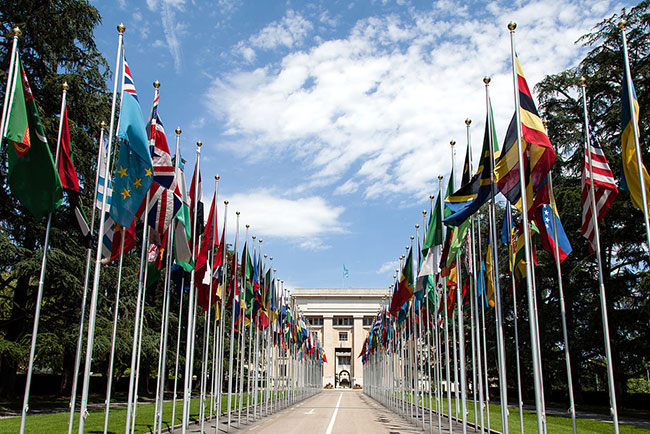
At first glance, this may seem like a strange assertion. After all, although needs continue to surpass the ability to provide, donor funding for humanitarian operations has skyrocketed. From less than US$1 billion in 1989, the global humanitarian budget stood at US$22 billion in 2013. Most of these funds come from a small number of Western donor states. But coupled with this rise in funds comes a donor agenda that risks, even if unintentionally, undermining the humanitarian ideal. This challenge is far from the only one posed to humanitarian action — much worse for the security of humanitarian workers are the terrorist groups that target them, leading to the killing of an estimated 152 aid workers in 2013. But because humanitarian action depends on a moral consensus over its meaning and worth, the current trajectory of donor policies is worrisome.
The humanitarian ideal is based on international solidarity: that outsiders can and should provide aid and protection in a principled, non-partisan, needs-based manner to civilian casualties of war and political violence. This ideal of politically disinterested solidarity with fellow human beings caught up in war and violence, regardless of who or where they are, has always been at some remove from the reality of humanitarian operations, but a consensus has nevertheless existed that it is an ideal worth aspiring to. Recently, though, donor governments have been increasingly open and unapologetic about using humanitarian aid to further their own political or security objectives.
One such objective is to keep immigration down. Since most man-made humanitarian crises have displacement as a core component, one objective of Western donor support of humanitarian aid to refugees is to contain population movement. The vast majority of refugees — people who have fled for their lives across international borders — remain within their near region, in camps or regional cities. Only a small proportion attempt the long journey to Europe, Australia, or North America in hope of jobs and a better future. Western humanitarian donors would prefer that even fewer asylum seekers make it to their own shores, while refugee host states in the Global South would like burden-sharing and solidarity to mean more than monetary charity from the well-off to the poorer.
Containment strategies seem to be working. While refugee numbers are increasing overall, including in industrialized states, the proportion of refugees hosted by developing states has grown over the past ten years from 70 percent to 86 percent. In Lebanon, there are 178 Syrian refugees for every thousand Lebanese inhabitants (in Jordan, the number is 88 per thousand). But efforts by the UN High Commissioner for Refugees (UNHCR) to resettle particularly vulnerable Syrian refugees have had lukewarm responses. This donor attitude of charity from afar coupled with hostility to asylum seekers and unwanted migrants in general, undermines the moral underpinnings of humanitarianism. After all, the Good Samaritan, often put forward as the embodiment of the humanitarian spirit, did not leave a few coins with the battered traveller he found by the wayside. He took him home and nursed him.
Another trend undermining the humanitarian ideal is the increased, and increasingly unapologetic, strategic use of aid to further donors’ own foreign and security policy objectives. There is a clear increase in the past couple of decades in the earmarking of funds and channelling of resources, not necessarily to the neediest of humanitarian victims, but to those deemed more relevant to donor interests. The ‘hearts and minds’ campaigns in Afghanistan and Iraq in the 2000s are the starkest representatives of this trend. As US-led intervention forces aimed to win over local populations by disbursing aid, the overall share of US overseas aid channelled through the US Department of Defense rose from 5.6 percent in 2002 to 21.7 percent in 2005.
These donor trends of openly pursuing domestic, foreign, and security policy goals through humanitarian aid are detrimental to the long-term future of humanitarian action, since they undermine the consensus and the ethical values underpinning the humanitarian ideal. While other challenges also loom, the strategies (and strategizing) of donors should have been included as a core topic of the Global Consultations.
Dr Anne Hammerstad, University of Kent, is author of The Rise and Decline of a Global Security Actor: UNHCR, Refugee Protection and Security. She writes and tweets on refugees, humanitarianism, conflict, and security. You can follow her on Twitter at @annehammerstad.
To learn more about refugees, conflict, and how countries are responding, read the Introduction to The Rise and Decline of a Global Security Actor: UNHCR, Refugee Protection and Security, available via Oxford Scholarship Online. Oxford Scholarship Online (OSO) is a vast and rapidly-expanding research library. Launched in 2003 with four subject modules, Oxford Scholarship Online is now available in 20 subject areas and has grown to be one of the leading academic research resources in the world. Oxford Scholarship Online offers full-text access to academic monographs from key disciplines in the humanities, social sciences, science, medicine, and law, providing quick and easy access to award-winning Oxford University Press scholarship.
Subscribe to the OUPblog via email or RSS.
Subscribe to only law articles on the OUPblog via email or RSS.
Subscribe to only politics articles on the OUPblog via email or RSS.
Image: United Nations Flags by Tom Page. CC-BY-SA-2.0 via Wikimedia Commons.
The post Donor behaviour and the future of humanitarian action appeared first on OUPblog.


By: Alice,
on 6/20/2014
Blog:
OUPblog
(
Login to Add to MyJacketFlap)
JacketFlap tags:
Journal of Refugee Studies,
Khalid Koser,
oxford jorunals,
United Nations High Commissioner for Refugees,
kanalstein,
returnee,
seekers,
conflict,
Journals,
Current Affairs,
Multimedia,
climate change,
poverty,
world refugee day,
refugees,
refugee,
sari,
UNHCR,
Social Sciences,
Editor's Picks,
*Featured,
afghan,
Add a tag
By Khalid Koser
There seems to be an international day for almost every issue these days, and today, 20 June, is the turn of refugees.
When the United Nations High Commissioner for Refugees (UNHCR) releases its annual statistics on refugees today, these are likely to make for gloomy reading. They will show that there are more refugees today than any previous year during the 21st century, well over 16 million. They will demonstrate how in three years Syria has become the single largest origin for refugees worldwide – around one in seven Syrians has now fled their country, including one million children.
The statistics will also show that solutions for refugees are becoming harder to achieve. Fewer refugees are able to return home. Palestinian refugees still do not have a home; there are still almost three million Afghan refugees, many of whom have been outside their country for generations. The number of refugees who are resettled to richer countries remains stable but small, while the number offered the chance to integrate permanently in host countries is dwindling.
The risk of World Refugee Day, like other international days, is that it will raise awareness of these and other challenges for a few days, before the media cycle and public attention moves on. But there are at least three ways that even passing interest can make a lasting difference.
First, a global overview provides the opportunity to place national concerns in a wider context. Many people and countries fear that they are under siege; that there are more asylum seekers, fewer of whom are recognised as refugees, who pose challenges to the welfare system, education and housing, and even national security. What the statistics invariably show, however, is that the large majority of refugees worldwide are hosted by poorer countries. Iran and Pakistan have hosted over one million Afghan refugees for over 30 years; there are millions of Syrian refugees in Lebanon, Jordan, and Turkey. It is in these countries that refugees may have a real impact, on the environment or labour market or health services, for example, yet by and large these poorer countries and their citizens continue to extend hospitality to refugees.
Second, World Refugee Day should be the day not just to take stock of refugee numbers, but also to ask why their numbers are rising. Refugees are a symptom of failures in the international system. There is no end in sight for the current conflict in Syria. The withdrawal of most international troops from Afghanistan by the end of 2014 is likely to make the country more insecure and generate a further exodus. Persistent and recurrent conflicts in Somalia, Mali and the Democratic Republic of Congo continue to generate refugees. In all these countries poverty and inequality intersect with insecurity to drive people from their homes. Climate change is likely to exacerbate these effects.

In an effort to bring forth the latest research and make this World Refugee Day count, Oxford University Press has gathered a collection of noteworthy journal articles addressing the latest policies, trends and issues faced by refugees around the globe and made them freely available to you. Simply explore the map above for links to these free articles.
Third, World Refugee Day brings research to the fore. The statistics needs to be analysed and trends explained. The stories behind the statistics need to be explored. Why are so many asylum seekers risking their lives to travel long distances? What are the actual impacts – positive and negative – of asylum seekers and refugees? Researchers can also leverage passing media interest by providing evidence to correct misperceptions where they exist.
This is what I see as the purpose of the Journal of Refugee Studies: to publish cutting edge research on refugees; to correct public debate; to inform policy; and to maintain attention on one of the most pressing global issues of our time. Refugees deserve more than one day in the spotlight.
Dr. Khalid Koser is Deputy Director and Academic Dean at the Geneva Centre for Security Policy and Editor of the Journal of Refugee Studies. He was also recently appointed Member of the Order of the British Empire (MBE) for his services to refugees and asylum seekers in the UK.
Journal of Refugee Studies aims to publish cutting edge research on refugees; to correct public debate; to inform policy; and to maintain attention on one of the most pressing global issues of our time. The Journal covers all categories of forcibly displaced people. Contributions that develop theoretical understandings of forced migration, or advance knowledge of concepts, policies and practice are welcomed from both academics and practitioners. Journal of Refugee Studies is a multidisciplinary peer-reviewed journal, and is published in association with the Refugee Studies Centre, University of Oxford.
Subscribe to the OUPblog via email or RSS.
Subscribe to only social sciences articles on the OUPblog via email or RSS.
The post Making World Refugee Day count appeared first on OUPblog.

posted by Neil Gaiman
One of the reasons I'm smiling so widely in this picture is I'd just been talking to the people in Azraq camp who run the child friendly space it was taken in. They were mostly from UNICEF.
They had explained that when the kids arrived in the camp, only the previous week, they didn't talk or make noise. They were subdued. When they drew pictures, the pictures were of explosions, of severed body parts, of weapons and dead people.
The camp had only been open two weeks. The kids I saw and spoke to were kids – noisy, happy, curious, hilarious, and they showed us their drawings, of butterflies and children and mountains and animals and hearts.
That's what I'm smiling about. That room full of noisy kids was the best place in the world.
I spoke to some of these children, who told me about their lives in Syria during the troubles, about their escape (“there were rocks in the desert, and we had to turn on the headlights to see, but when they turned on the headlights of the car people would shoot at us, and my parents were frightened, but I wasn't...”). For some of them it had been three years since they last went to school.
I made the mistake of reading some of the comments in the Guardian article, and on Twitter, who seemed convinced that me talking about the kids in the camps was a sentimental attempt to take their attention from the real business at hand, which was supporting whichever side in the conflict you already supported loudly and vocally. Obviously, a political crisis that's bad enough to produce refugees is only going to be sorted out politically. But pretending that people hurt, displaced and fleeing are just a vague sort of irritant, that lives wasted or destroyed don't matter, in order to prove your ideological point, whatever it happens to be, is, to my mind, both lazy and foolish and very, very wrong.





posted by Neil Gaiman
I haven't blogged for a while. I suspect that's partly because I'm back on Twitter, and I seem either to blog or to tweet, and partly because I've been exhausted. Tweeting time comes out of dead time, usually – time in taxis, or waiting in corridors. Blogging time usually comes out of sleeping time.
I should be writing, now, writing things people are waiting for. But I need to blog as well...
It's foggy where I am today, and I can't tell where the sky ends and the sea begins. In a few days I go to Norway, to Sweden and to Spain, for a slew of appearances and interviews. Looking over the schedule, I suspect that some of the signings may be hard, as very limited amounts of time are scheduled for them, and immediately afterwards I'm due at the next event or interview or thing.
Last week I was in Jordan, and then landed, still shaken up, and went straight to the British Library, where I talked about Sandman and Art and Life with Tori Amos, then got up on the stage and read some stories to an audience, then collapsed.
I went to Jordan, as I reported here, for the UNHCR, the United Nations Refugee Agency, to visit the Syrian Refugee Camps and report on what I found.
Last year I wrote a short film for Georgina Chapman to direct, and we really liked each other, and she said yes when I asked if she'd like to come with me to Jordan. We had both planned to bring our spouses – I had expected that Amanda would be there but that Harvey Weinstein (to whom Georgina is married) would just get too busy, because Harvey is always busy. Instead, Amanda found herself dealing with a perfect storm of things, including health issues and, most importantly, an unfinished book, and could not come, and Harvey was there, showing a side I've not seen in the 20-odd years I've known him.
No Amanda made the Jordan trip easier, as I didn't have any attention on anyone else at any time I was in the camps, and much harder, as I really would have given the earth for a hand to squeeze at some points in the camps, or for someone to hold.
I would write about the Jordan trip here, but I wrote what would have been my blog already.
This is the link to the main article, which I wrote for the Guardian http://rfg.ee/x6Kon.
This is the link to the Guardian pictures – I wrote captions to the images, or UNHCR took them from my end of day video diary http://rfg.ee/x6Kef .
And here's an interview I did with the BBC World Service, while I was out there. If I sound a little shaken, I am.
I came away from Jordan ashamed to be part of a race that treats its members so very badly, and simultaneously proud to be part of the same human race as it does its best to help the people who are hurt, who need refuge, safety and dignity. We are all part of a huge family, the family of humanity, and we look after our family.
Please share the links, especially the link to the main Guardian article at
http://rfg.ee/x6Kon. Share them aggressively. Make people read them. It's important, and I'll be grateful. Thank you.





posted by Neil Gaiman
I landed in Jordan late this afternoon. I'm in my hotel right now. I'll be up for a 6 am pick-up -- I need to be at the camp for bread distribution, first thing in the morning.
Since the start of the Syrian warfare, over two and a half million people have fled the fighting and gone somewhere else. Half a million of them have come to Jordan. The population of Jordan is a little over 6 million. By percentage of the population, that's what would happen if twenty five million people arrived as refugees in the US over a couple of years, or five million people sought refuge in the UK. It means lots and lots of people here have Syrian families living with them. It means that there are refugee camps -- small cities built in the desert, all temporary structures.
I was invited to come out here by UNHCR - the United Nations Refugee Agency - with the purpose of making one or more short films, telling stories and writing articles that draw attention to what's going on in refugee camps.
They've created a web page at
http://donate.unhcr.org/neilgaiman so that people can follow on and see what's happening.
I packed for myself on this trip and, for various reasons, did a terrible job of packing and remembering what to bring. And every time I start getting grumpy for not having something, it occurs to me that the people I'm seeing tomorrow brought with only what they could carry for often hundreds of miles - and that included carrying children...





I was struck yesterday by a news item about a UN report that states that the number of refugees in the world is now at a twenty year high – with a person leaving their home to seek refuge and safety every four seconds. Every four seconds. That is the state of our world. Syria alone now accounts for 1.6 million refugees. And world wide 46 percent of refugees are under eighteen – essentially children by our own definition.
So last year approximately 2 million children left their homes, sometimes with parents, sometimes without, to find a safer place to live. Children born into war, prejudice and starvation. These two million joined the seven million who are already out there.
.jpg)
Contrary to the image portrayed by some sectors of the media the majority of these refugees are being supported and looked after by the developing world – 86 percent of all refugees are in the care of the developing world.
And a statistic that took me by surprise, one in four of all refugees is from Afghanistan – and has been for the past 32 years. For 32 years there has been a steady stream of people fleeing Afghanistan in search of safety. A country that the US has spent $636,000,000,000 being at war with (and this number increases every second – see Cost of War website for the figures)
Today is World Refugee Day – the UN has a page detailing how people can help refugees and you can find it here. Small things can make a difference.
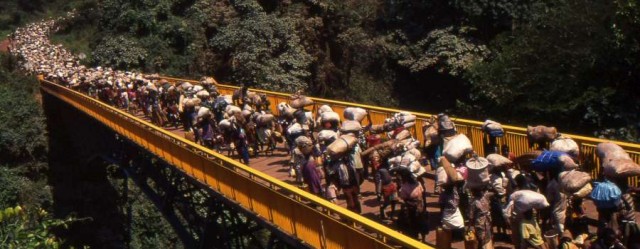


By: Anastasia Goodstein,
on 6/16/2009
Blog:
Ypulse
(
Login to Add to MyJacketFlap)
JacketFlap tags:
microsoft,
Campus,
Ben Affleck,
Facebook Causes,
Gimme Shelter,
refugees,
Rolling Stones,
Microsoft Student,
The Rolling Stones,
UNHCR,
Add a tag
 To commemorate World Refugee Day this week, corporate sponsor Microsoft Student has pledged $50,000 to UNHCR's "Gimme Shelter" campaign through the Causes application on Facebook. For every person who joins the cause, Microsoft will donate $1, and... Read the rest of this post
To commemorate World Refugee Day this week, corporate sponsor Microsoft Student has pledged $50,000 to UNHCR's "Gimme Shelter" campaign through the Causes application on Facebook. For every person who joins the cause, Microsoft will donate $1, and... Read the rest of this post



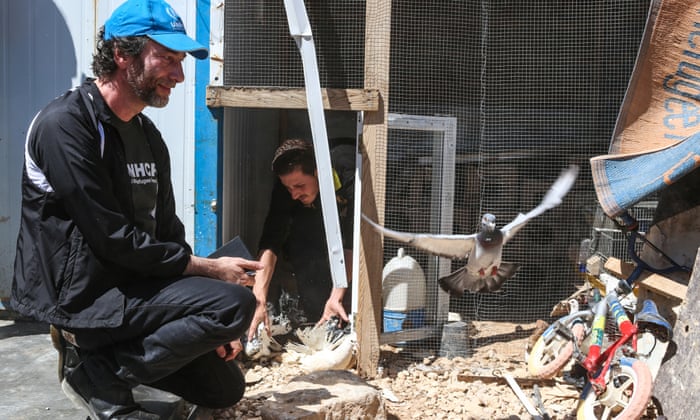


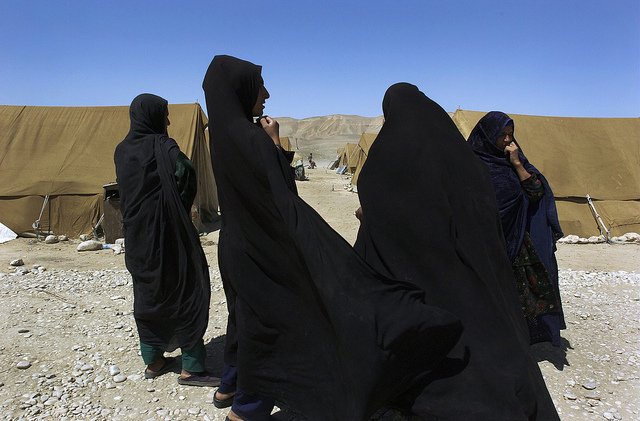



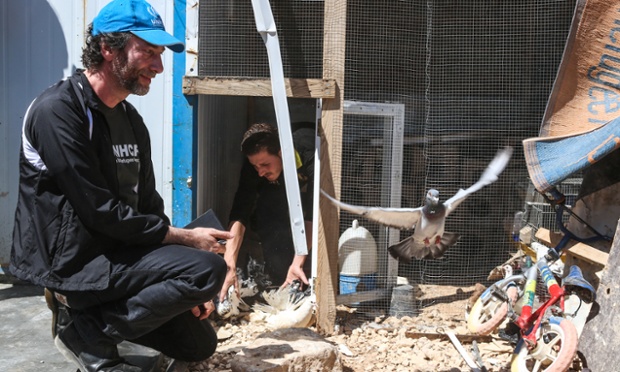

.jpg)

